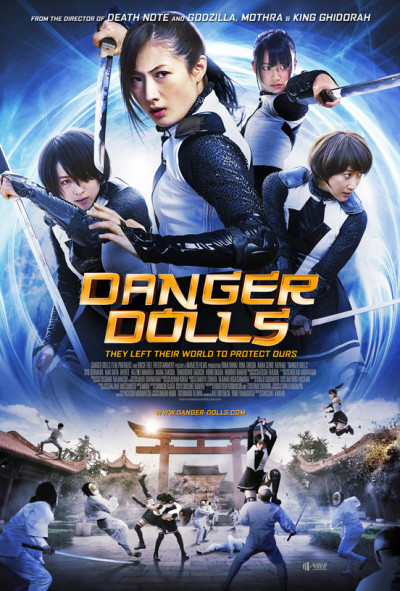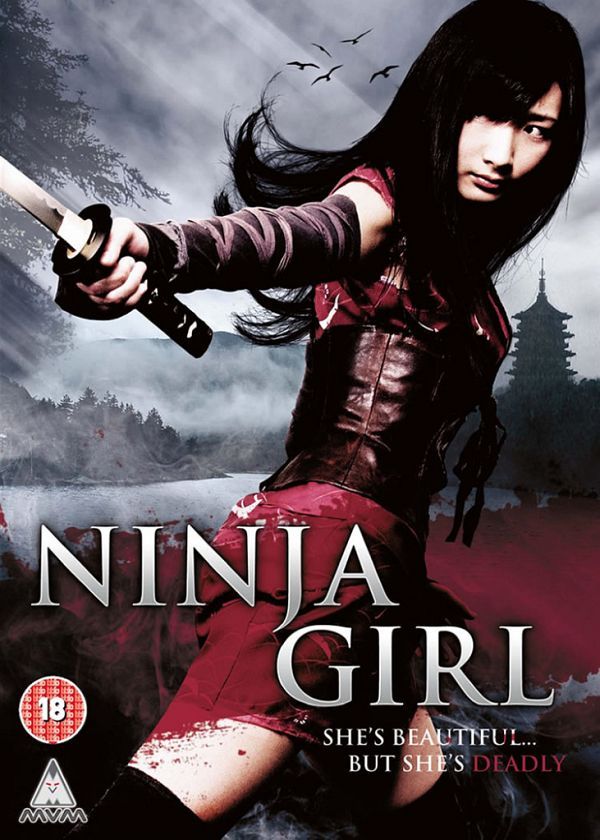★★½
“A fishy tale”
 Perhaps I just expected more from the combination of martial artist Takeda (High-Kick Girl, Karate Girl) and Iguchi (Mutant Girls Squad, The Machine Girl). While this has its moments, it falls well short of the best works of either star or director, delivering neither the action nor the insanity, of which I know both are capable. The set-up is fine. Takeda plays Keiko, the daughter of a sushi master, who leaves home after being told by her father she’ll never amount to anything. She gets a job working in a Japanese hot springs inn, and isn’t much good at that either.
Perhaps I just expected more from the combination of martial artist Takeda (High-Kick Girl, Karate Girl) and Iguchi (Mutant Girls Squad, The Machine Girl). While this has its moments, it falls well short of the best works of either star or director, delivering neither the action nor the insanity, of which I know both are capable. The set-up is fine. Takeda plays Keiko, the daughter of a sushi master, who leaves home after being told by her father she’ll never amount to anything. She gets a job working in a Japanese hot springs inn, and isn’t much good at that either.
A pharmaceutical company are having a get-together there, but Yamada, a disgruntled employee is also in attendance. His invention which rejuvenates dead cells was successful, but had side-effects, for which he was blamed and arrested. So he has taken revenge by using his creation to animate the sushi being served to the company. Oh, and this is not only infectious, transmitted by the sushi’s bite, it makes them capable of flying. And breeding. It is, of course, up to Keiko and a few hardy allies to fend off the killer delicacies.
It’s mostly the stuff around the edges which is effective here. There’s a little egg sushi, looked down on as inferior by its fish-flavored relatives, who becomes a valuable ally to Keiko. Oh, and it sings. Yes, folks: adorable, singing sushi. You’ll never eat nigiri again. Some of the lines are also ludicrous enough to make me laugh out loud; here are a few examples.
- When you hurt a sushi chef’s pride, his next dish is death!
- Sushi has a pecking order too.
- It is my duty to tell the boss we are under siege by man-eating sushi.
- The sushi are mating!
However, there’s not much in the way of escalation or progression. Once you’ve seen one plate of attack sushi, you’ve more or less seen them all. About the only other thing the film has to offer isn’t until the end, when Yamada turns himself into a gigantic man-tuna and there’s a battleship made of fish eggs. While I will admit to not having seen either of those before, the imagination seems very sporadic otherwise, though I did like Keiko’s briefly-used sushi-nunchaku. This being a Noboru Iguchi movie, we do get multiple fart jokes, of course.
Takeda’s talents are also sadly underutilized. I don’t know whether Iguchi couldn’t be bothered to get anyone decent for her to fight, or if it’s more that the concept allows limited scope for karate to blossom. With the attack sushi being largely CGI, there’s only so much flailing at thin air anyone can do. Iguchi regular Asami has a supporting role here: while she has shown some solid action skills elsewhere, it’s indicative of something, that she and Takeda look to have about the same level of fighting talent. I was certainly hoping for better from Takeda, and the film in general.
Dir: Noboru Iguchi
Star: Rina Takeda, Kentarô Shimazu, Takamasa Suga, Takashi Nishina






 From the director of Alien vs. Ninja, the story here centres on a pair of ninjas, Shimotsuki and Hyotsuki, who are carrying on what appears to be a family tradition, kidnapping women from other clans’ villages, and taking them back to their own for nefarious purposes – let’s just say, the phrase “tools of pleasure” crops up on more than one occasion. They ar returning with their latest batch of four, including Kisaragi (Takeda), who is a ninja in her own right. With the help of a mysterious man (Sato), Kisuragi and her colleagues in imprisonment are released from their bondage – but that is only the first obstacle between them and their freedom. Of course, it turns out the heroine is not quite as innocent as she appears, and has an agenda of her own, because her mother was kidnapped by the same sleazy ninjas, when Kisuragi was just a baby.
From the director of Alien vs. Ninja, the story here centres on a pair of ninjas, Shimotsuki and Hyotsuki, who are carrying on what appears to be a family tradition, kidnapping women from other clans’ villages, and taking them back to their own for nefarious purposes – let’s just say, the phrase “tools of pleasure” crops up on more than one occasion. They ar returning with their latest batch of four, including Kisaragi (Takeda), who is a ninja in her own right. With the help of a mysterious man (Sato), Kisuragi and her colleagues in imprisonment are released from their bondage – but that is only the first obstacle between them and their freedom. Of course, it turns out the heroine is not quite as innocent as she appears, and has an agenda of her own, because her mother was kidnapped by the same sleazy ninjas, when Kisuragi was just a baby. The film manages to cram just about every cliché of martial-arts films into its 92 minutes, with a plot driven by four major threads:
The film manages to cram just about every cliché of martial-arts films into its 92 minutes, with a plot driven by four major threads: The entertainment value you get from this may depend on your expectations. It undoubtedly works best as a party-tape, show-casing the “no wires, CGI or stunt doubles” approach, but I have to beg to differ with some of the critical savaging it has received. Even
The entertainment value you get from this may depend on your expectations. It undoubtedly works best as a party-tape, show-casing the “no wires, CGI or stunt doubles” approach, but I have to beg to differ with some of the critical savaging it has received. Even  Last month, we saw MMA star Gina Carano hit the big-screen in Haywire, but she’s not the first genuine female martial-artist to have started a movie career. Most obviously, Cynthia Rothtock was a five-time World Karate Champion in forms and weapons, and has a number of black belts in various disciplines. Similarly, Jeeja Yanin was a third-Dan black belt in Taekwondo, before hitting the silver screen in Chocolat. But here, we’ll be looking at the name that has recently emerged out of Japan, Rina Takeda, holder of a black belt in Ryukyu Shorin-ryu Karate.
Last month, we saw MMA star Gina Carano hit the big-screen in Haywire, but she’s not the first genuine female martial-artist to have started a movie career. Most obviously, Cynthia Rothtock was a five-time World Karate Champion in forms and weapons, and has a number of black belts in various disciplines. Similarly, Jeeja Yanin was a third-Dan black belt in Taekwondo, before hitting the silver screen in Chocolat. But here, we’ll be looking at the name that has recently emerged out of Japan, Rina Takeda, holder of a black belt in Ryukyu Shorin-ryu Karate.